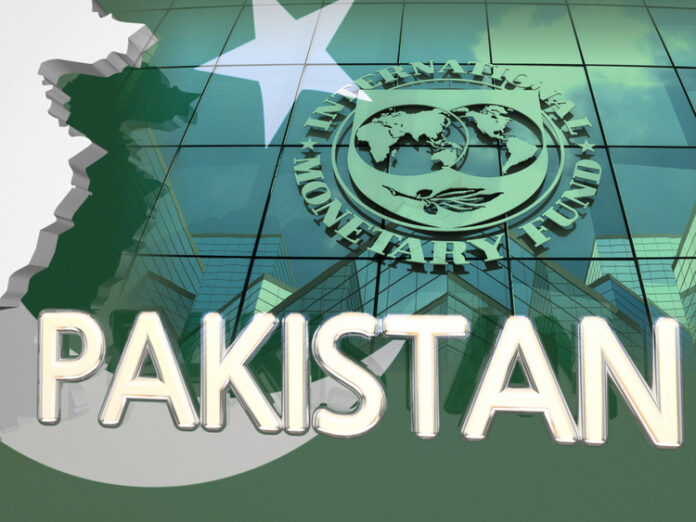ISLAMABAD: The International Monetary Fund (IMF) said Monday Pakistan’s inflation and debt-to-GDP ratio were expected to fall to 4.8% and 73%, respectively, in 2025.
In a five-year forecast, the IMF said there would be a considerable slump in the country’s loans, as well as inflation. This decrease, it added, would be witnessed starting 2021.
It added that inflation would go down from 10.5% to 4.8% in five years. The rates in 2021, 2022, 2023, 2024, and 2025 were forecast at 9.0%, 8.0%, 6.1%, 4.9%, and 4.8%, respectively.
The IMF noted that debt-to-GDP ratio would also decrease from 90% to 73% in five years. The rates in 2021, 2022, 2023, 2024, and 2025 were forecast at 87.8%, 83.7%, 80.8%, 77.4%, and 73.0%, respectively.
Meanwhile, IMF’s Resident Representative Maria Teresa Daban Sanchez has said that the international lender would continue to provide its support to Pakistan to face the socio-economic challenges posed by the coronavirus outbreak.
She was speaking at the online policy dialogue organised by the Sustainable Development Policy Institute (SDPI) on IMF’s support to Pakistan under Rapid Finance Instrument (RFI), existing Extended Fund Facility (EFF) and debt rescheduling.
She said that IMF was happy at the way Pakistan was implementing different policies to achieve fiscal consolidation and macroeconomic stability, adding that the performance of Pakistan’s economy prior to the emergence of coronavirus and its devastating impacts, had been quite satisfactory.
Sanchez apprised the participants of IMF’s toolkit to fight the COVID-19 shock that included the RFI which Pakistan would be utilising. She noted that the IMF’s assessment of the situation was that COVID 19 would reverse the decline in public debt that resulted from fiscal consolidation efforts. This would also result in increase of primary deficit, she added.
She appreciated the government’s decisive response to the COVID-19 outbreak, including cash transfers to most vulnerable families, lowering down policy rate, eliminating import duties on several items, and other initiatives to provide relief for the low-income segments of society.
Commenting on opening up of the construction sector, she said that IMF supported opening of labour intensive sector where daily wagers may be absorbed. However, she hoped that amnesty announced for investment in construction sector was temporary in nature, and would be withdrawn once situation becomes normal.
“The IMF recommends that Pakistan as well as other countries recalibrate their policy actions as we move on. Therefore, the regulatory measures taken are temporary and regulatory relaxation might not be necessary in the future as it can create problems”, she added.
She said that the ongoing EFF programne was very much intact, adding that IMF was working closely with the authorities in Pakistan and the next review mission may take place virtually.
Regarding the EFF, she said that as the medium-term economic outlook was changing, the IMF had to recalibrate everything from targets to trajectories. However, we need to continue working on EFF as a framework as the programme provides continuity along with a healthy and sustainable trajectory from an economic point of view. “It is encouraging that the government is committed to fiscal consolidation and reforms once the things get normal,” she added.
While commenting on the overall impact of COVID-19 outbreak on Pakistan’s economy, she said that there would be a significant cut in imports from Pakistan in various countries, the remittances would be reduced, tax collection would reduce considerably and the growth rate may get reduced to -1.5 per cent. It is in this context that funds under RFI arrangement would help Pakistan to bridge the gap in immediate financing needs, she added.
Going forward, in post COVID-19 times, she added, the IMF is working to make Pakistan as competitive and open as possible by making it more export oriented and an attractive destination for investment.
Speaking on the occasion, SDPI Executive Director Dr Abid Qaiyum Suleri highlighted Pakistan’s recent engagements with the IMF and said that the coronavirus pandemic had brought socio-economic uncertainties with a lengthy period of emergency response that would result in global recession.





IMF and other agencies are setting a trap they doesn’t want Chinese to extend support to Pakistan hence IMF gave this new loan which is termed as aid by them
i read the article
it has a really new subject and i’m wonder about it
it was so new for me
IMF is an organization controlled by those powers that don’t want to see the growth of Pakistan.